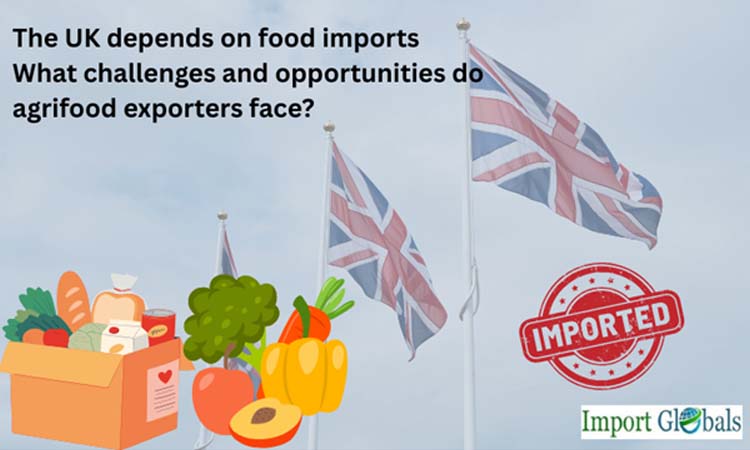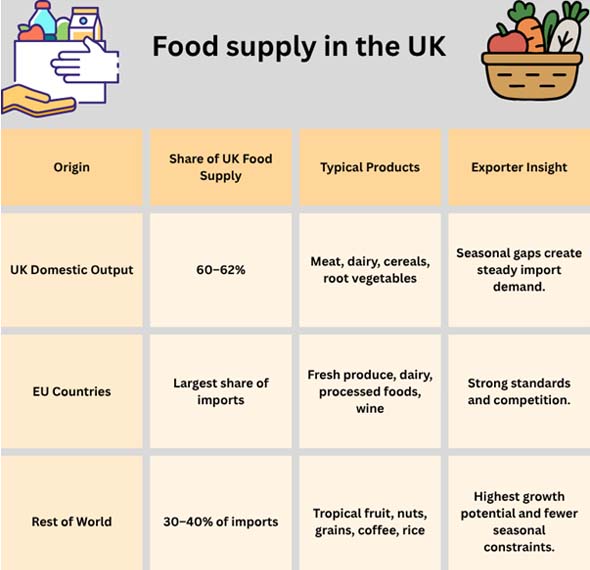
- Nov 22, 2025
The UK Depends on Food Imports: What Challenges and Opportunities Do Agrifood Exporters Face?
The country has a long history of farming, yet it still needs food from other countries to stay stable. A lot of what British people eat comes from other countries.
They include fruits and vegetables that are in season, tropical foods, specialty ingredients, and prepackaged meals. This dependence offers both large opportunities and big risks for exporters of food and agriculture around the world. As per UK Import Data by Import Globals, exporters that wish to stay in the UK market for a long period need to grasp how the country's food supply operates.
1. How much the UK depends on Imports
As per UK Export Data by Import Globals, the UK only grows around 60 to 62 percent of the food it eats. This means that about four out of every ten food items come from other countries. The UK doesn't have a gap because it can't grow crops; it's because of the weather, the quantity of land available, and the fact that crops can only be cultivated at particular periods of the year. The British people desire a lot more variety than what farming in the UK can give them.
The UK is one of the greatest net importers in the world, bringing in more than £60 billion worth of food and drink every year. This mix of imports includes drinks, processed meals, fruits, vegetables, cereals, animal feed, and spices. Even though the UK makes a lot of its own dairy, meat, and grains, it still has to import these things all year long because of variations in the seasons and problems with the supply chain.
2. Where the UK obtains its Food From
The UK gets food from more than 180 countries, but most of it still comes from Europe, which is the UK closest neighbor. The EU is still the dominant provider because of its location, long-standing economic links, and shared quality standards that have been in place for decades. Fresh fruits and vegetables, meat preparations, dairy products, baked goods, and wine are some of the most common commodities that come from the EU.
South America is a big supply of livestock and fruit, Africa and Asia are major providers of spices, tea, coffee, and cocoa, and Oceania is a key source of meat and dairy products. Countries like India, Vietnam, Brazil, Peru, South Africa, Kenya, and Thailand are becoming more and more important for the UK when it comes to getting tropical and specialty items.
3. A quick look at the food supply in the UK

4. Risks of the UK Relying Too Much on Imports
Imports make the UK's food system better, yet the country is at risk since it depends on supply networks from other countries. As per United Kingdom Import Export Trade Data by Import Globals, exporters need to know about these dangers.
4.1 Risks to the environment and the Climate
Extreme weather is affecting the way people farm all across the planet. A lot of the fresh fruits, vegetables, and cereals that the UK obtains come from locations where the weather is increasing hotter, dryer, wetter, and stormier. Because of this, a lack of goods in Spain, Morocco, India, or South America can quickly cause prices to go up and shelves to be empty in UK stores.
As per United Kingdom Import Custom Data by Import Globals, the UK's own crops have also been harmed by climate change. The weather in the area has messed with the farming cycles since it rains a lot in the winter, is too hot in the summer, and changes all the time. Because of this mix, the country is more likely to have environmental concerns in other countries.
4.2 Changes in Trade and Geopolitics
Because the UK is not a member of the EU, it is harder for food to move between countries. Supply chains don't work as well when tariffs, customs checks, and other laws change. At the same time, conflicts, sanctions, and prohibitions on exports can make it harder for products to flow between countries.
New trade agreements, like the ones with Australia and New Zealand, have made it easier to get goods into the UK. However, they have also made UK farmers worried about how much they will have to spend to compete. As per United Kingdom Import Trade Analysis by Import Globals, exporters need to find a method to make money while also being politically correct.
4.3 Concentration of the Supply Chain and Retailers' Power
There are only a few huge supermarkets in the UK that sell food, and they have a lot of power over prices, quality standards, packaging regulations, transportation timetables, and sustainability needs. Getting on a supermarket's list is a significant deal for exporters, but it can be hard to meet these strict conditions.
But the payoff is just as big: stable buying over time and access to one of Europe's most profitable consumer sectors.
5. Opportunities for Exporters of Agrifood
Even while there are worries, the fact that the UK still relies on food from other countries affords producers around the world a lot of chances.
5.1 Giving the UK something it can't create
Some items can't be cultivated in the UK because of the weather, hence there will always be a demand for:
- Some tropical fruits are mangoes, bananas, papayas, and avocados.
- Specialty items include things like tea, coffee, chocolate, and spices.
- Okra, eggplant, and certain peppers are examples of vegetables that do well in warm weather.
- These groups illustrate that there are good chances to import goods all year long that domestic manufacture can never replace.
5.2 Closing Seasonal Gaps in UK Farming
The UK has problems cultivating some crops all year, yet they do well at particular seasons of the year. Exporters who can provide tomatoes, berries, grapes, leafy greens, apples, or citrus to the UK during the off-season have a strategic advantage. As per United Kingdom Export Data by Import Globals, British buyers want items to always be available, thus it's really crucial to have reliable overseas suppliers.
5.3 Meeting the Demand for Eco-Friendly, Organic, and High-Quality Products
The UK is one of the most advanced markets in Europe for high-end food categories. Customers and stores demand more and more:
- Fruits and vegetables that are cultivated without using chemicals
- Goods that are fair trade
- Things that are helpful for the environment or that help the weather
- Meat and dairy that are excellent for animals
- Foods with less leftovers and "clean labels"
- Exporters who can prove that they care about the environment, have certificates, and have clear ways to keep track of their goods can stand out and earn higher positions.
5.4 Growth in international foods, Processed Foods, and Convenience Foods
As Britain's culture becomes more diverse, the demand for cuisines from other countries keeps rising. More and more people can buy sauces, snacks, meals that are ready to cook, frozen foods, baked goods, and food from foreign nations. The growth of convenience meals, meal packages, and health-focused drinks is also being driven by urban living and changing eating habits.
6. Helpful advice for exporters who want to sell to the UK
To do well in the UK, exporters must meet the country's criteria for quality, sustainability, and reliability.
6.1 Learn the UK Standards and How to Follow Them
In the UK, there are tight rules about labeling, pesticide residues, hygiene certification, and packaging. As per United Kingdom Import Data by Import Globals, the paperwork is harder now that Brexit has happened. Exporters who stay up to date on the rules might safeguard their goods from being stopped or turned away at the border.
6.2 Put dependability before Cost
As per United Kingdom Import Trade Statistics by Import Globals, British stores really like things to be the same. Exporters need to prove that they can ship on schedule, keep the cold chain in good order, and always provide high-quality goods. If products aren't consistent, they could miss out on opportunities even if they are similar in price.
6.3 Make it easier to track and make things Last Longer
Retailers require more and more information about how their products affect the environment, labor conditions, animal welfare, and carbon footprint. As per United Kingdom Export Import Global Trade Data by Import Globals, in the UK market, having clear and verifiable facts makes you far more credible and competitive.
6.4 Choose the Best Way to Get into the Market
Supermarkets, importers, wholesalers, foodservice channels, and internet platforms are all ways for exporters to get into the UK. As per United Kingdom Import Shipment Data by Import Globals, many exporters begin by working with specialized importers who help them with logistics and following the rules. After that, they work with bigger retail partners.
The End
Not only for a short time, but for a long time, the UK has depended on food imports. As per United Kingdom Import Export Trade Analysis by Import Globals, this is because of the weather, where it is, and what people want to eat. Because it depends on imports, the UK is at danger from climate, geopolitical, and market issues. But there are several opportunities for global agrifood exporters who can provide safe, high-quality, and long-lasting goods.
Exporters who know the UK market, meet its requirements, invest in traceability, and make sure there is always enough supply are likely to perform well. As the UK adjusts its food system after Brexit, the best way for global suppliers to make the most of one of the world's most dynamic food markets is to work together and plan for the long term. Import Globals is a leading data provider of United Kingdom Import Export Trade Data.
FAQs
Que. Why does the United Kingdom get so much of its food from other countries?
Ans. Because people in the United Kingdom want a lot of different things, and they want them all year round.
Que. Which countries send the United Kingdom the most food?
Ans. Most of the products come from EU countries. Tropical and specialist commodities come from South America, Africa, and Asia.
Que. What kinds of things are most likely to be sent to other countries?
Ans. Tropical fruits, spices, cereals, organic foods, world-cuisine items, and value-added foods, as well as fresh fruits and vegetables from other seasons.
Que. What is the hardest thing for those who sell things?
Ans. Maintaining a consistent supply while adhering to stringent United Kingdom retail standards for quality, safety, packaging, and sustainability.
Que. Where to get detailed United Kingdom Import Export Global Data?
Ans. Visit www.importglobals.com.
